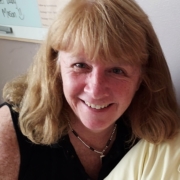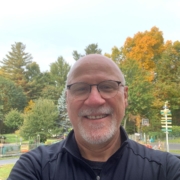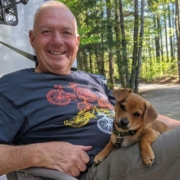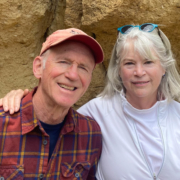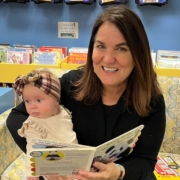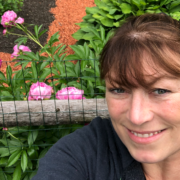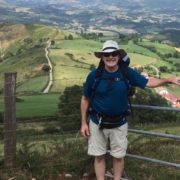CASA Advocate Kathleen Bernstein

After retiring early, Kathleen Bernstein knew she still had more to give the world. Having “spent enough time making rich companies richer,” as she puts it, Kathleen decided to donate the rest of her working career away. She and her husband adopted their own two children, who are now grown, when they were six-and-a-half and almost five years old. By stepping forward to become a Court Appointed Special Advocate, Kathleen works directly to help other children either be reunited with their parents or have a smooth transition to adoption.
Kathleen isn’t one of the longest tenured volunteers at CASA of New Hampshire. But looking at the considerable list of children she’s advocated for in her three years as a CASA—11 children from six families—that’s hard to believe. The need for more CASA volunteers is immense, and it’s tough for Kathleen to turn down a case knowing it could mean leaving a child without anyone solely dedicated to looking out for them and their wellbeing.
Kathleen remarks, “If I had to do it all over again I would. I would definitely go through the training. I think I get more than I give to my kids. I’m proud when they sing in their high school concerts, and when they introduce me around. It will be the volunteer option I will do until I can’t do it any longer. Although maybe I won’t take on four cases at once like I have now!”
On one of her current cases, Kathleen is the advocate for a youth who has been in the protective system a number of years. Originally, the child had a male CASA, but as she got older it was agreed that she could benefit from the support of a female CASA. “She was a teenager when I started working with her,” says Kathleen, “and I assumed that I would be with her until she was 18 to 21.” This is because sadly, the adoption rate for teens is much lower than for younger children. “She’s had a rough life. But through some additional efforts it now looks like she’s going to be adopted soon. When we all got on the conference call and got to tell her that we’d found the family for her, we were all crying.”
“It’s worth the effort,” Kathleen says. “It’s worth the time you put into it, as little or as much as you can put into it. If you can only take one case, once case is still good. One case is one child or a few siblings that you can help show that somebody else cares.” She continues, “They’re hard cases, they’re really hard cases, but then it’s all worthwhile when you get a child reunited with their parents or adopted, especially if they are in their teens. She and her success make the hard days worth it. Now she has a very loving family.”
Many CASAs have their niche—an age range or set of family dynamics or circumstances where they excel and find particular gratification. Volunteers are encouraged to accept cases that are the right fit for them. While Kathleen has advocated for children of all ages (like the four-year-old with whom, she says, “we play tag until my feet can’t take anymore”), it’s working with teens that she finds most rewarding.
“With the teenagers, sometimes it’s challenging getting them to talk and open up. A six-year-old will tell you anything. But with a teenager you get a lot of ‘It’s OK. Yeah, I’m good.’ It’s challenging to build that relationship, so that they trust you and they know that you’re going to be there. But it’s the most rewarding when they finally say, ‘OK, this is what I want…’”
Kathleen builds these relationships by pointing out to her teens that CASAs are volunteers. For instance, she says, “When I explain that I can’t take them anywhere in my car because I’m a volunteer they say, ‘You’re a volunteer? Why would you do this?’ And I tell them it’s because I like young adults, and being able to be the one person who comes and talks to them. Sometimes we’re the one person in their lives who isn’t paid to be there. The older ones are a little more jaded. They see a lot of therapists and social workers, but I’m just there because I want to be there.”
Kathleen admits that it’s not always easy being a CASA. She explains, “There are nights where I lose sleep over what I’m going to say, or what I’m going to do—for example, when I’m fighting for a child’s right to stay in their school district when there are financial decisions that counteract what is in their best interest. But I believe I’m making a difference, even if it’s only one child, one year, one life at a time.”
One child, one year, one life at a time. Kathleen’s words are humble, but in her case, this can be multiplied by 11. In the history of CASA of NH, it’s over 10,000 children. 10,000 lives. But Kathleen’s message is clear: even if it was only one, all her effort, even the difficult moments, would still be worth it.
Kathleen has given so much, and she has also gained some. “I think I look at the world a little differently in some ways. Moms have it hard, dads have it hard, and the world’s not making it any easier. But I think I try to be a little bit more compassionate, a little bit more understanding. When I’m in the grocery store and there’s a mom struggling with two small children I tell her, ‘It gets better, it’ll get easier’ and ask if she’d like help loading her bags into the car, or something like that.” Add that to the long list of ways Kathleen is making a difference in the lives of children and families
If you would like to become a CASA volunteer advocate and help children, consider attending an upcoming virtual information session to learn more, or submit an application today.

